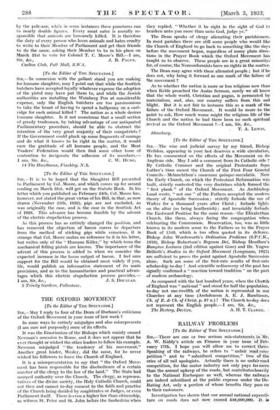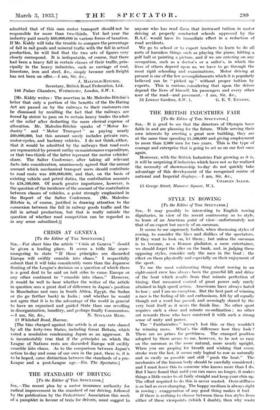RAILWAY PROBLEMS
[To the Editor of THE SPECTATOR.]
SER,—There are one or two serious mis-statements in Mr. A. W. Kiddy's article on Finance in your issue of Feb- ruary 17th. I hope you will allow me to correct them. Speaking of the railways, he refers to " unfair road com- petition " and to " subsidized competition," two of the cries of all rail apologists. Actually there is no unfair road competition, for the motor industry not only pays far more than the annual upkeep of the roads, but contributes heavily to the National Exchequer as well, whereas the railways are indeed subsidized at the public expense under the De- Rating Act, only a portion of whose benefits they pass on to their customers.
Investigation has shown that our annual national expendi- ture on roads does not now exceed £48,000,000,. It. is admitted that of this sum motor transport should not be responsible for more than two-thirds. Yet last year the industry paid nearly £60,000,000 in various forms of taxation. If Mr. Kiddy will take the trouble to compare the percentage of fall in rail goods and mineral traffic with the fall in actual production, he will find that the two sets of figures very closely correspond. It is indisputable, of course, that there had been a heavy fall in certain classes of their traffic, prin- cipally in the heavy industries, such as carriage of coal, limestone, iron and steel, &c., simply because such freight has not been on offer.—I am, Sir, Sw., J, MALCOL3I-RITCHIE, [Mr. Kiddy writes : The assertion in Mr. Malcolm-Ritchie's letter that only a portion of the benefits of the De-Rating Act are passed on by the railways to their customers can be dismissed by recalling the fact that the railways arc bound by statute to pass on to certain heavy trades the whole of the relief after deducting the mere clerical expense of allocation. Mr. Malcolm-Ritchie speaks of " Motor In- dustry " and " Motor Transport " as paying nearly £60,000,000, but this amount surely includes private cars, motor-cycles, and hackney vehicles. I do not think, either, that it would be admitted by the railways that road costs are represented by present outlay on maintenance expenditure, or that two-thirds of the latter represent the motor vehicles' share. The Salter Conference, after taking all relevant facts into consideration, unanimously agreed that the annual amount which mechanical transport users should contribute to road costs was £60,000,000, and that, on the basis of existing vehicle and petrol duties, the contribution amounts to £58,500,000. Of much greater importance, however, is the question of the incidence of the amount of the contribution between classes of vehicles, a point strongly emphasized in the Report of the Salter Conference. (Mr. Malcolm- Ritchie is, of course, justified in drawing attention to the connexion between the fall in railway goods traffic and the fall in actual production, but that is really outside the question of whether road competition can be regarded as in any sense subsidized.)]



















































 Previous page
Previous page